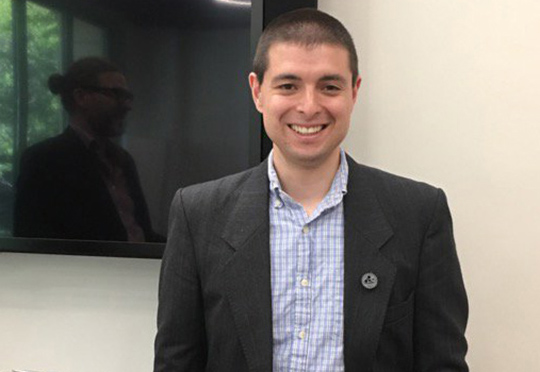 Though he has now earned two bachelor’s degrees and a doctoral degree from MIT, was a Ph.D. intern at Microsoft and is a post-doctoral researcher, a younger Nathan Matias didn’t always appreciate the importance of an interdisciplinary education. In his teens, he was enamored with computers. Just computers.
Though he has now earned two bachelor’s degrees and a doctoral degree from MIT, was a Ph.D. intern at Microsoft and is a post-doctoral researcher, a younger Nathan Matias didn’t always appreciate the importance of an interdisciplinary education. In his teens, he was enamored with computers. Just computers.
When his mother insisted he learn chemistry, all he wanted to do was write software. Chemistry, he said, had nothing to do with programming. “I was the only student in my class, and my parents offered a wide range of learning,” Matias said of his home-school education, but chemistry was not part of his personal agenda.
At her wits’ end, Matias’ mother called the E-town Department of Computer Science. “Tom Leap spoke to her and, a few weeks later, I was in his office,” Matias said of his mother’s conversation with the College’s associate professor of computer science. “Tom helped me see that computing is not just what’s inside the box but is a lens for what’s outside the box.”
In that conversation, Leap described some of his past work, explaining how computers don’t make sense unless you are using them in conjunction with the rest of the world.
“At that age,” Matias said, “it was a profound gem of wisdom.”
He completed his chemistry course and, a few years later, when he was looking at colleges, Matias realized he could explore all of his passions at Elizabethtown. In 2001, when he declared his major as a Blue Jay, it was not in computer science as his younger self assumed it would be, however. Matias chose English literature.
“To me,” the alum said, “English literature is a way for me to explore a world of experience with a human perspective. … A book is an amazing window.”
In his last year at Elizabethtown, Matias, a member of the College’s Honors Program, earned a Davies-Jackson Scholarship. The award offers a unique opportunity for students with exceptional academic records, who are among the first in their families with a college degree, to participate in a course of study at St. John’s College at the University of Cambridge, in the United Kingdom.
So, in 2005, Matias graduated from Elizabethtown with a bachelor’s degree in English literature and a minor in computer science and a second bachelor’s degree in English from the U.K., where he’d spent half of his time supporting various nonprofit organizations as well as a citizen’s media project, he said.
Next, Matias earned his doctoral degree from the MIT Media Lab, which brings together a uniquely diverse community of creators and researchers: “It’s poets, designers, psychologists, engineers. They are selected because they are good at making connections between things that others might not see,” Matias said, echoing the information Leap had shared years earlier.
At the Media Lab’s Center for Civic Media, researchers study how “everyday citizens can use media to make change.” As example, he described a project in Brazil in which a phone app is used to record infrastructure promises, and he talked about large-scale social science projects for which the internet is technology as art.
“My own world,” he said, “has focused on human and machine behavior and how they interact.” His dissertation in June 2017 was on the role artificial intelligence plays in large-scale human behavior.
Over the years, Matias has been a Ph.D. intern at Microsoft, has conducted extensive research at Harvard and is now a post-doctoral researcher in psychology, sociology and the Center for Information Technology and Policy. And, with each step, Matias said, he carries with him Leap’s wisdom and a question he formed at Elizabethtown: “ ‘As I create work, how can my work benefit others?’ For me, it’s central to all I do.”

